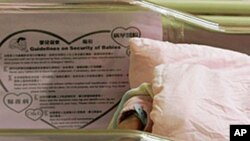Some residents in Hong Kong are expressing frustration at the pressure put on its public services by thousands of pregnant women from mainland China. Some people believe these expectant mothers are secretly entering the territory to give birth and secure for their child the so-called "right of abode" in Hong Kong and lifelong access to a standard of public education and health care unavailable in China.
Hong Kong has proudly preserved a unique social and cultural identity, both under British colonial rule and since the return to Chinese sovereignty in 1997.
That identity continues to flourish, in part because Beijing has tolerated Hong Kong’s relative autonomy since the hand over under the principle of “One Country, Two Systems.”
But legislator Leung Yiu-chung does not believe that Hong Kong residents identify readily with the notion of one nation.
“When you are talking about identity, I think people in Hong Kong seldom recognize themselves as Chinese; from China. We don’t want the Chinese government, or Chinese people who come from China, to rule Hong Kong,” Leung said.
Direct political influence aside, there is increasing concern that Hong Kong’s identity risks being diluted by an ever-growing number of pregnant mainland Chinese women entering the territory to give birth.
According to Health Secretary York Chow, in 2005 such child births numbered “in the hundreds.” By last year, more than 40,000 children, or about one-half the total number of babies born in Hong Kong, were born to mothers from across the border.
Hong Kong University constitutional law analyst Benny Tai says that, if that rate continues, in 10 to 15 years mainland Chinese will form a substantial part of the Hong Kong population.
“So people will worry that this will change the culture of Hong Kong society; our core values will be “polluted.” That is why it is contentious,” Tai stated.
Hong Kong immigration officials refused entry to 3,560 pregnant mainland women last year. But more are arriving in Hong Kong every day; some opportunistically walking through border controls, others smuggled across by organized crime syndicates in trucks and even speedboats.
The health service says it cannot cope. Emergency room staff are overwhelmed by the number of mainland women in labor - around 1,650 in 2011 compared to just 500 in 2010.
As a deterrent, Mainlanders are now charged around $6,000 to give birth in the territory. However, a 2001 judgment by the Court of Final Appeal found that Hong Kong’s mini-constitution, the Basic Law, confers the right of abode on any child of Mainland parents born in the territory.
The right of abode confers eligibility to access Hong Kong’s public services, including health, education and housing. Critics say $6,000 is money well spent to pay for services that are unavailable in China.
Public protests are increasing. They include pregnant Hong Kong women who say their own deliveries are threatened by the strains put on medical resources.
The identity debate intensified in late December, when Hong Kong University’s annual public opinion poll on perceptions of ethnicity indicated that over 70 percent of respondents considered themselves to be “Hongkongers” before being “Chinese.” The figure represented a 10-year high.
Within days, the polling unit’s director, Robert Chung, was publicly rebuked by Hao Tiechuan, a senior Beijing envoy.
Hao was quoted in local media, saying that Hong Kong is not an independent political entity.
With the Chinese year of the Dragon approaching -- a popular and auspicious year to give birth -- the debate about mainland babies has been picked up by candidates in Hong Kong’s forthcoming leadership election.
On Sunday, Albert Ho was chosen by the city’s pan-democratic coalition to compete against two pro-Beijing candidates for the office of chief executive. In a radio broadcast Monday, he called for the Basic Law to be amended to, in his words, “plug the floodgates”.
Benny Tai agrees that such an outcome could occur, but says he has reservations. “To amend the Basic Law … or to have a reinterpretation of the Basic Law … creates more problems," he said. "That will require the assistance of the central government.”
Any intervention by Beijing would inevitably cause concern in a city used to solving its own problems, without Mainland interference.




